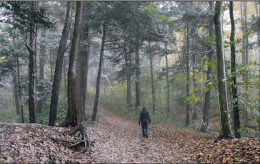905 words
I recently went with a friend to deliver some groceries to a guy who had a medical problem and couldn’t get to the store. We went to this person’s house and found him on his couch, watching The Breakfast Club on video. He was in his late thirties. His overall style was “hipster.” He wore sweatpants, dirty socks, and a beanie. He was quiet and serious in his personality, a bit sullen, and he had trouble making eye contact. He seemed reluctant to say much in the presence of a person he didn’t know (me).
We brought the groceries and sat with him for an hour or so. He had several different medical problems. Back pain was what prevented him from going to the grocery store. He told us about his other ailments. He was scheduled to get an MRI soon. One of his doctors had suggested this. There were a lot of doctors in his life. He was a person who had fallen into a general malaise and sickliness, was my general impression.

You Can buy F. Roger Devlin’s Sexual Utopia in Power here
But then, as we talked, it came up that he’d been on a vision quest the summer before. I was surprised to hear that. I asked him about it. He was reluctant to say much, but I got the basics out of him: There’s some preparation. Then you go to the desert. Depending on where you are, you set up a camp. It sounded like he’d gone with some other guys. I asked more questions. Was there peyote involved? Did you have shelter? How many people were there?
He was vague on these details. I suspected he was afraid he would sound too “woo-ish.” But I wasn’t trying to embarrass him. I was genuinely curious. I wanted to know what constitutes a vision quest in our feminized, wimpified cultural environment.
I tried to picture the kind of adults that might be interested in a vision quest. In my mind, I saw people with tattoos and piercings, the type who go to Burning Man, the people who say things like: “It’s all good,” or “Everything happens for a reason.”
When I got home, I googled “vision quest” and immediately found The School of Lost Borders, who offers, for a fee, to take you through the vision quest process. Looking at their website I realized this was probably what my hipster friend had done.
This School of Lost Borders is what you’d expect. It was founded by a stereotypical Southwestern desert boomer couple. The husband is pictured in cargo shorts, Tevas, long grey hair. His wife wears the requisite turquoise jewelry. The two of them have built up a nice little business of sending lost souls into the desert to find themselves. I don’t mean that as a criticism. I’m sure starving yourself for several days under the stars in the desert is an experience you will never forget, and may shock you into some new thoughts and perspectives.
Still, the videos and testimonials seemed to indicate that these were indeed “lost” people: scrawny, confused, low self-esteem adult men (mostly young and white). There were some young women too, mostly overweight and unattractive. Nobody seemed to have anything going on in their lives. Even the hardships they shared on camera were cringe and uninteresting. They were literally just “lost.”
The School of Lost Borders’ solution to these people’s angst was a combination of boomer New Age tropes, Native American mysticism, and “working on myself” style therapy. What I found interesting though, was that inside this mish-mash of self-help ideology were some striking and familiar themes.
From the website of The School of Lost Borders:
In your bones you hear the singing of your sacred ancestors. You follow in their footsteps. You go alone, with an empty belly and a bare minimum of equipment, into the heart of the wilderness, for four days and night. There you live with yourself, in perfect solitude. You surrender to the mirror of your wild environment, and to memory, the looks-within-place. You ponder the questions: “Who am I?” “Who are my people?” What is my intent?” You wander the precincts of your loneliness, where vision lies waiting. You drink at the springs of your soul and are filled with self-recognition. What is not important falls away. The work that must be done lies ahead.

You can buy Greg Hood’s Waking Up From the American Dream here.
I know. Pretty based! After I read this, I thought about the hipster guy on his couch with his Breakfast Club video. He doesn’t know what caused his afflictions, but he nevertheless craves relief. He feels a need to cleanse himself, to be restored to his original, organic state. He seeks a place where he is truly “at home” and at one with his ancestral heritage. And so he signs up for a vision quest.
Political dissidents are on a similar quest.
We, too, want freedom from hostile environments. We want authentic communities around us. We want truthful, unmanipulated communication in our media and our cultural networks.
We are fortunate to have the capacity to educate ourselves on these issues. That poor guy on the couch suffers as much from his lack of understanding as he does from his ailments. And so he finds himself alone in a desert, without focus, without purpose, and with no real vision at all.
Enjoyed this article?
Be the first to leave a tip in the jar!
Related
-
Remembering Flannery O’Connor (March 25, 1925–August 4, 1964)
-
Lent Observations
-
Mysticism as the Path to Political and Social Change: The Aristocratic Radicalism of Mystics and Occult Thinkers
-
Counter-Currents Radio Podcast No. 568: Ask Me Anything with Millennial Woes
-
Thoughts on Decadence and the American Ethos
-
Nueva Derecha vs. Vieja Derecha, Capítulo 14: Religión Civil Racial
-
Senses Working Overtime: Bertrand Russell’s The Problems of Philosophy
-
David Zsutty Introduces the Homeland Institute: Transcript
4 comments
Nicely said.
Well said. I have to wonder how much the man’s physical ailments would heal if he was able to fix his spiritual ailments.
There’s a lot of broken “lefties”, “liberals”, “hipsters” etc out there who could probably be gently nudged in the right direction. What problem remains is how to do this without scaring them off?
The worst thing the left is doing is to attempt to rob us of our identity.
JMHO, but all answers can be found in our identity.
Comments are closed.
If you have Paywall access,
simply login first to see your comment auto-approved.
Note on comments privacy & moderation
Your email is never published nor shared.
Comments are moderated. If you don't see your comment, please be patient. If approved, it will appear here soon. Do not post your comment a second time.